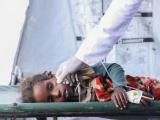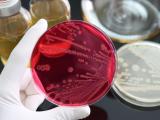Mar 30, 2004 (CIDRAP News) – The US Department of Agriculture (USDA) yesterday announced it has certified seven state laboratories to help test cattle samples for bovine spongiform encephalopathy (BSE) in the agency's expanded BSE surveillance program.
"USDA's intensive BSE surveillance program requires increased laboratory capacity strategically located across the country," Ron DeHaven, USDA's chief veterinary officer, said in a news release. "Reducing the distance to the nearest lab will help ensure that we have the most rapid turnaround time possible."
The laboratories will use rapid BSE tests that were recently approved by the USDA. The USDA's National Veterinary Services Laboratory in Ames, Iowa, remains the national reference lab for BSE and will conduct confirmatory tests on any samples that test positive at the state labs, the agency said.
The seven laboratories are the California Animal Health and Food Safety Lab System at the University of California, Davis; Colorado State University Veterinary Diagnostic Laboratory, Fort Collins; Texas Veterinary Medical Diagnostic Laboratory, College Station; University of Wisconsin Animal Health Laboratory, Madison; Washington State University Animal Disease Diagnostic Laboratory, Pullman; Athens Diagnostic Laboratory, University of Georgia; and the New York State College of Veterinary Medicine at Cornell University, Ithaca.
The seven facilities are part of an existing network of state and federal labs that help the USDA's Animal and Plant Health Inspection Service (APHIS) with animal disease testing as needed. Other labs that meet the USDA's criteria may be certified in the future, the agency said.
The certified labs will receive federal funding "as needed for high throughput testing equipment," the USDA said. "We're looking at up to $500,000 for each lab," Andrea McNally, a spokeswoman for APHIS in Washington, DC, told CIDRAP News.
On Mar 15 the USDA announced plans to test hundreds of thousands of cattle for BSE over the next 12 to 18 months to ascertain the disease's prevalence in American herds. The agency estimates there are 446,000 cattle at increased risk for BSE, and plans call for testing as many as possible. Carcasses of tested cattle will be held until test results are in, officials have said.
The USDA says that if only 1 in 10 million US cattle, or 5 in the whole country, have BSE, investigators will be 99% likely to find them if 268,000 cattle are tested. Last year the agency tested about 20,000 cattle for the disease. The discovery of BSE in a cow in Washington state last December triggered the plan to expand surveillance.
McNally said the USDA doesn't "necessarily have specific targets" for how many samples each lab will test, but one criterion for certification was the ability to test at least 1,000 samples per month. "They'll have the ability to analyze much more than that," she said.
USDA officials confirmed Mar 19 that they had licensed two rapid BSE screening tests. They are the TeSeE test made by Bio-Rad Laboratories Inc., Hercules, Calif., and the HerdCheck BSE Antigen Test Kit, made by IDEXX Laboratories Inc., Westbrook, Me.


















